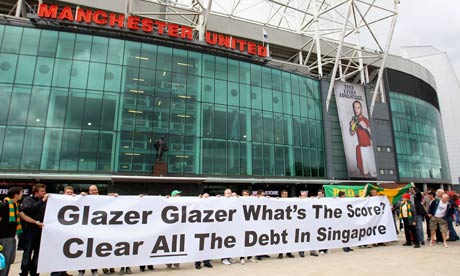Six and the City. A play on words relating Manchester United’s 6-1 home loss to bitter rivals Manchester City and the female glamour television program Sex and the City. Up to this point of the season, Manchester United was on a real roll, unbeaten in all league matches. But now it seems as though their on-field success might take a severe turn for the worst after the weekend’s humiliation. However all is not as blue as the Manchester City kit, because Manchester United released news of an over-seas victory 3 days after the loss. Not an on-field victory, but one off the playing field and into the business world.
According to an article on Oct. 25th in The News of India, Manchester United announced a 3 year deal with a telecom deal with Pakistani company Zong. The deal with Zong will give United fans in Pakistan the access to watch goals, exclusive interviews, and news from Old Trafford. Manager Sir Alex Ferguson was quoted claiming the telecom company “will be a key player in allowing us to bring the passion and excitement of Manchester United to the people of Pakistan.
The expansion of the fan viewing experience is a recent trend for Manchester United and many other of the top European clubs. It seems as though Manchester United though is leading the way, strengthening the image of their brand wherever there is demand. Manchester United’s commercial director, Richard Arnold described the strategy as “Using our digital assets to engage our global fan base is an increasingly important part of our commercial strategy and we are very excited about the possibilities presented by this partnership.” Manchester United is just as much a business as it is a soccer team, as on-field success is just as important as off-the-field success. That’s what makes United stand out among the rest in terms of global branding and reputation. They have realized the importance in offering their service to a much wider audience as demand for the sport continues to grow, especially in developing areas.
So why Pakistan? In a cricket-mad country of 180 million, football is gradually gaining popularity with youngsters in urban areas even staying up late to watch their favorite players in action in the Premier League. Football's popularity is growing in part because a cable subscription for around 200 rupees ($2.50) a month gives viewers access to most major football league matches played around the world. Manchester United has seized the opportunity to tap into a growing demand center, and you can’t blame them. It is this strategy that has seen their brand grow and they will not stop implementing this strategy across the world any time soon. Up next Nepal…….not really, but you never know who’s on the agenda of the Red Devils.
Sources: http://articles.timesofindia.indiatimes.com/2011-10-25/epl-news/30319598_1_united-fans-premier-league-pakistan
